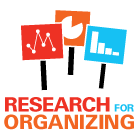ABOUT THIS TOOLKIT
What Is It?
Over the last decade, TakeRoot Justice (previously called the Community Development Project) has partnered with dozens of grassroots organizations to conduct Participatory Action Research (PAR). Through this work, we have developed a range of trainings, tools and tips for organizers and community members to become more actively involved in the research process. This toolkit synthesizes all of the resources that we have designed and gathered over the years. It is a comprehensive facilitator’s guide and toolkit that will assist grassroots organizations in the step-by-step process of conducting research in support of organizing. Ultimately, we hope it will help your community to build the power to win social and economic change!
How to Use It?
The toolkit is structured into seven sections with each section focusing on a key step in the practice of PAR. Each section consists of various Activities, Tools and Case Studies that should support your organization throughout the research process.
Activities
The activities allow a facilitator to lead participants through a series of interactive exercises in order to learn more about a specific component of the PAR process. They are structured as “facilitator guides” or step-by-step instructions for a facilitator to follow as they conduct the training with a group of participants. The activities can be used for groups anywhere between 3-40+ participants.
Tools
The tools include worksheets, templates and fact sheets. Some are designed specifically to go along with a corresponding activity while others are intended to stand on their own.
Case Studies
Some sections feature a case study of the Community Development Project’s past PAR projects. The case studies ground the activities and tools in concrete examples and provide useful lessons of how organizations have used PAR to strengthen their community organizing work.
Intended Audience
This toolkit can be used by community organizers, community members or students studying participatory research or community organizing. The activities are designed to be conducted by a facilitator that has experience in facilitating group discussions and with community organizing. The activities are intended to engage participants that are contemplating or engaged in an effort to conduct participatory action research.
For academic institutions:
We hope that the RFO toolkit is used widely by community organizations as well as students learning about participatory action research. We ask that when using or distributing the RFO toolkit in an academic course, using it in a syllabus or citing it in a paper or report, proper credit is given to the toolkit’s authors. Please use the following citation: Research for Organizing: A Toolkit for Participatory Action Research from the Community Development Project at the Urban Justice Center.
Who Created It?
This toolkit was a collaborative effort between the Community Development Project at the Urban Justice Center and various grassroots organizations.
About TakeRoot Justice
Founded in 2001, TakeRoot Justice (previously the Community Development Project at the Urban Justice Center) strengthens the impact of grassroots organizations in New York City’s low-income and other excluded communities. TakeRoot’s Research and Policy Initiative partners with and provides strategic support to grassroots community organizations to build the power of their organizing and advocacy work. We utilize a “Participatory Action Research” model in which low-income and excluded communities are central to the design and development of research and policy. Our work consists of the following: Participatory Action Research support and report development; grassroots policymaking; popular education curriculum design and training; facilitation of strategic alliances and coalitions; and strategic campaign research.
https://takerootjustice.org/
Toolkit Authors and Designers
Alexa Kasdan was the Director of Research and Policy at CDP from 2008 to 2018. During this time she oversaw the release of over 70 participatory action research projects in partnership with grassroots organizations. From 2006 until 2008 she was the Research and Policy coordinator at Community Voices Heard, where she designed and authored several reports about the welfare system and public housing. Alexa has a Master’s in Public Policy from Harvard’s Kennedy School of Government and a Bachelor’s Degree from the University of Wisconsin-Madison.
Lindsay Cattell was CDP’s Research and Policy Associate from 2009 to 2013. At CDP, she worked on participatory action research projects on issues like public housing, drug policy and worker’s rights. She holds a Bachelor’s in Mathematics from Eastern University. She has authored several reports, including “A Report Card for the New York City Housing Authority” and “South Bronx Residents’ Solution on Greening Our ‘Hood.”
Rosten Woo is a cultural producer living in Los Angeles. He makes work that helps people understand complex systems and participate in group decision-making. His work has been exhibited at the Cooper-Hewitt Design Triennial, the New Museum, the Venice Architecture Biennale, Netherlands Architectural Institute, the Lower East Side Tenement Museum, on the internet, and in various public housing developments, tugboats, shopping malls, and parks in New York City and Los Angeles. His first book, “Street Value,” was published by Princeton Architectural Press in 2010. He is co-founder and former executive director of the Center for Urban Pedagogy (CUP).
http://rostenwoo.biz/
Toolkit Advisory Team
Sondra Youdelman, Community Voices Heard
Joan Mineiri, Professor and Author
Sean Barry, VOCAL-NY
Anne Fredrick, Hester Street Collaborative
Vincent Villano, Community Voices Heard
Jonathan Hogstad, ROC-United
Anita Sinha, Advancement Project
Valeria Treves, New Immigrant Community Empowerment
Foundation Support
Thank you to the following foundations for their generous support of this toolkit:
New York Foundation
Mertz Gilmore Foundation
Solidago Foundation
